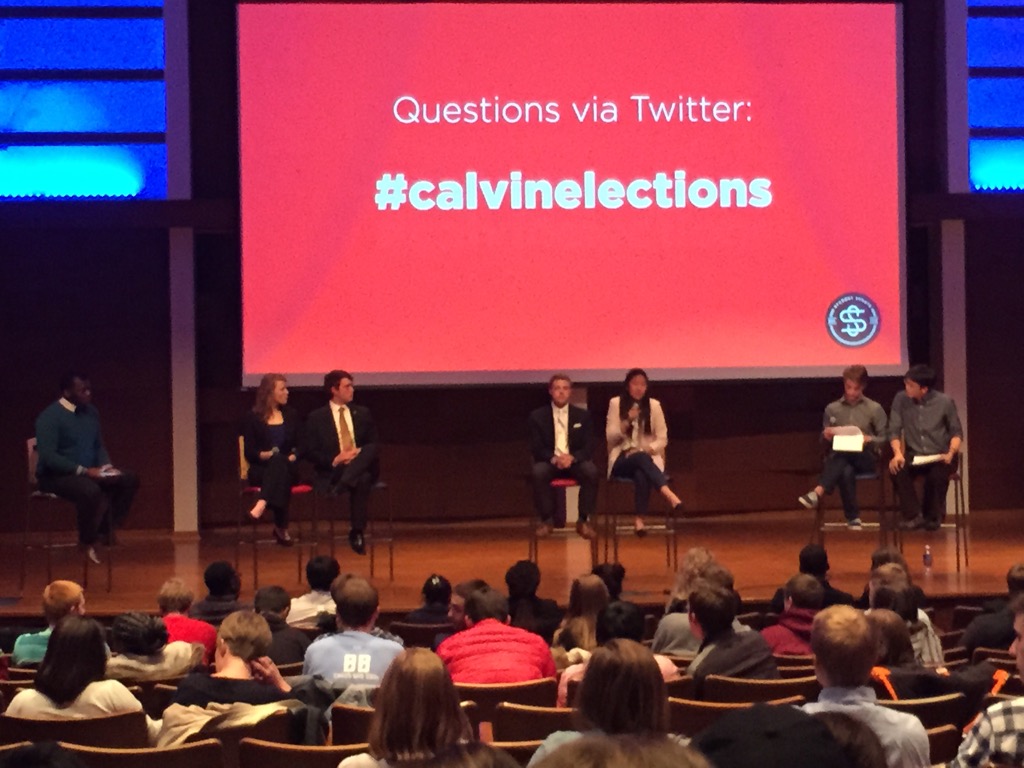On Wednesday, about 150 students gathered in the CFAC Recital Hall for the annual student senate electoral debate. Three executive teams will face off in this year’s student senate elections, while six candidates for senate and three for cabinet will run uncontested.
“Candidates are not just walking into senate,” said Jonathan Eigege, current student body president, “They need 500 votes for them to actually be voted in and be legitimate.”
“For me its better to have three people running for places than have six people that are unsure about whether some of them will do well if elected to office,” he continued.
Sophomores Ethan DeVries and Andrew Darmawan, juniors Jerry Grieser and Karis Kim and junior Ian Krug and sophomore Kimberly Louwsma each hope to be next year’s student body president and vice president, respectively.
“For me, sitting up there as president, I saw a lot of synergies from the different platforms,” said Jonathan Eigege, current student body president. “They talked about themes that oriented around the same thing. I really think all the students have the same goal, but they have different ways of going about it.”
Throughout the debate, candidates highlighted a shared passion for improving diversity at Calvin.
“Our main focus is diversity and inclusion,” said Grieser, an RA who served as a first-year senator and VP of public relations for student senate. “For a lot of those mainstream students, it can be difficult for them to be in the conversation and understand why diversity is a problem.”
As part of their platform, both Grieser and Kim, who works in admissions, feel that their experiences as minority students at Calvin enhanced their passions about diversity and inclusion at Calvin.
“Jerry is a gay student and Karis is Asian-American and a woman in the STEM field,” states the team on their official website. “We both understand the importance of diversity and the negative impacts that occur when minority students are not represented or supported well.”
DeVries, a current student senator who has worked with the Calvin Annual Fund, and Darmawan, a senator who currently serves as the finance chair of student organizations, also built their campaign around the importance of diversity, pressing for unity between separate groups.
“Unity is going out to students,” DeVries said, “and for that to happen there’s got to be a culture shift.”
One of the more controversial statements of the night came from Darmawan, an international student from Indonesia, about why he felt his campaign partner DeVries was suited for the job: “When you need to reach a 75 percent white student body, you need a white student president,” Darmawan said.
“I’m not saying that if you’re not white, you can’t be president,” Darmawan later clarified, “only that someone from that demographic can best lead that demographic to become more culturally competent.”
“The best way we can represent that diversity is not by the statistics or demographics we are identified by, but by sharing their individual stories and the cultural contexts which have shaped them,” DeVries and Darmawan said in a separate statement.
Candidates also focused their platform around accessibility and the relationship between student senate and the student body.
Krug, who is on Orientation Board and has served as an Orientation Leader, and Louwsma, who is a Perkins Fellow and has also been an OL, highlighted the problem of disconnect among students.
“Honestly, [students] are so ill-informed, it’s disgusting,” said Krug. “They don’t look at emails. No one really cares, so we are trying to reconnect. It’s going to be a long process.”
Louwsma agreed, while explaining that “senate needs to realize that the students need us. We need to go talk to them and make it more of a community setting: that means going out and speaking with students.”
After previous elections where executive teams ran nearly uncontested, Eigege is happy to see candidates preparing their campaigns.
“The executive team directs everything that senate does and I’m really happy that there are three platforms,” said Eigege.
“Just sitting up there, there were teams that had great arguments and there were arguments that were too broad,” Eigege said. “I want students to pay attention and see which of the teams has the clearest vision that’s operationable. I think when they do that it will become clear who to vote for.”
Contributions by Maddie Hughey.








